Janet Mock: Writing a New Vision for Hollywood
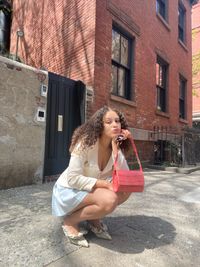

Everyone knows you're not supposed to judge a book by its cover. This is an adage that's particularly true when it comes to an impeccable force like Janet Mock. Her ability to serve looks on the red carpet is certainly noteworthy, but that doesn’t even begin to scratch the surface of her dynamic talent and multifaceted nature. Mock is the first transgender woman in history to land not one, but two publishing deals to tell her story on her own terms. She has written, directed, and produced for beloved series including Pose, Hollywood, and The Politician. She also signed a historic multimillion-dollar deal with Netflix (be on the lookout for her first project on the streaming platform, Scandalous!). And on top of all this, she’s received a slew of awards and honors from the likes of Time, Out, and GLSN, to name a few. Basically, Mock has been out here "doing the most” (a mantra she unabashedly admits to embracing over our Zoom call) for the past few years.
Incredible career accomplishments aside, I wanted to get to the center of what makes Janet Mock, well, Janet Mock. Like other trans people, Black people, and marginalized community members, Mock has by no means been exempt from how others choose to see and label her. Despite the many titles and identifiers she has been given over the past decade, she subscribes to one, in particular: storyteller. "A lot of people are just like, ‘You’ve done so many things in your career,’ and for me, I feel like I’ve only done one thing, which is just to tell stories,” Mock tells me. In many ways, that fluid label has been the through-line for everything she’s done in her career, allowing her to move through writing, directing, and producing with ease. It’s also very much present in how she approaches other facets of her life, such as personal style and self-care.
Stories hold collective power. They are embedded in the foundation of society and impact how we see each other. And there’s nothing more powerful than people on the margins being able to tell their stories. The beauty of Mock is that she’s been unrelenting in not sacrificing the vision she has for her stories, much less herself.
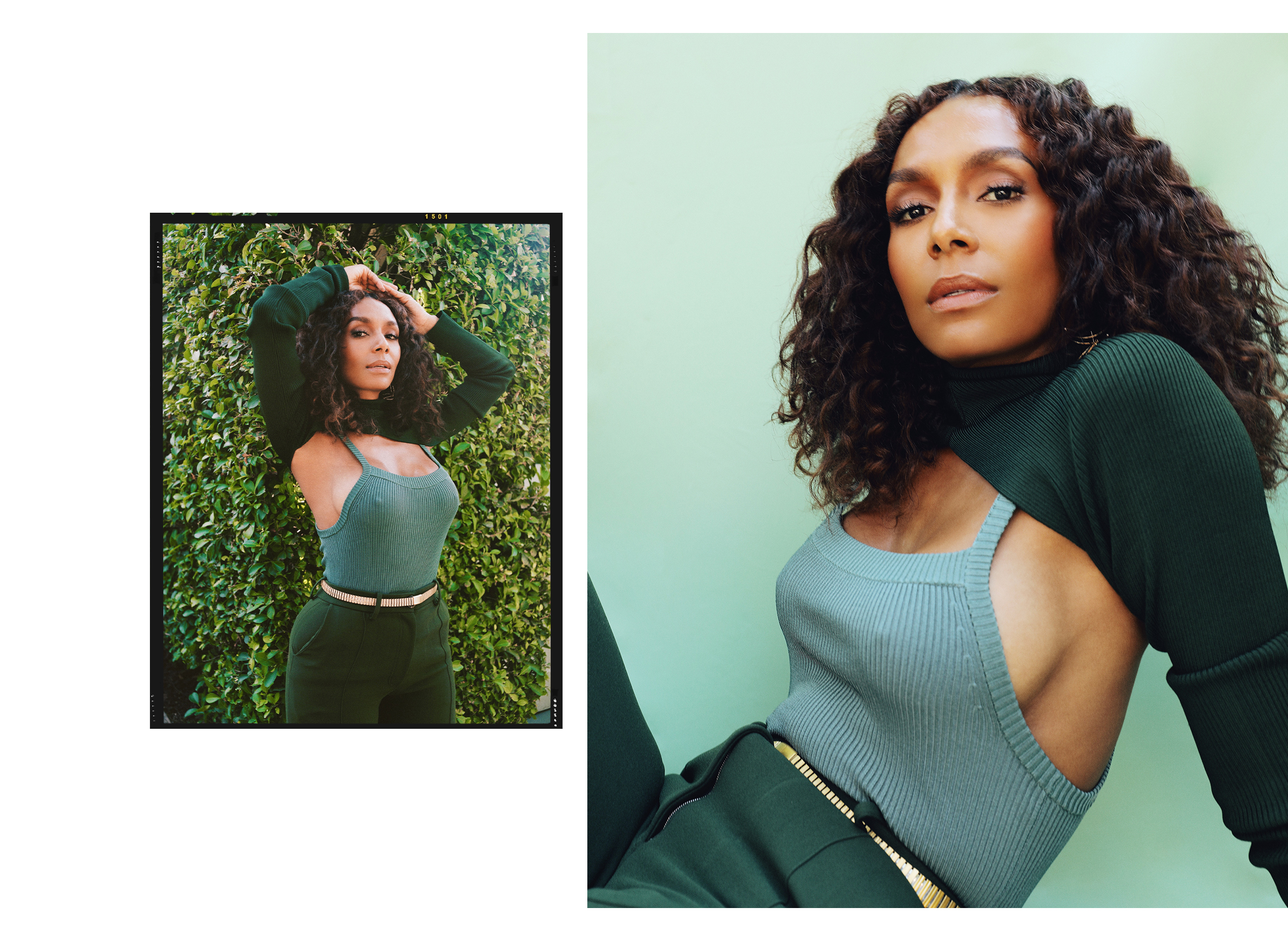
Mock's Personal Story
How do you feel about labels?
I find that most of the frustration around labels is how they can free us and how they contain us. On the one hand, I can understand how having a word to call yourself can be pivotal to the building blocks of self-advocating for yourself and identifying more people like you, just giving you a tangible way to say, "This is me,” that you can cling onto. I also think that labels are super limiting. There is no monolithic experience to any of the labels. For example, the labels attached to me (Black, trans woman, indigenous) come with their own connotations. That’s why concepts like intersectionality are so important because I can’t separate any of those parts of myself. I can’t just speak to one part of who I am. And often, the viewer—and how they view me—can come from the prisms of the labels that they’re most interested in talking about or prefer to prioritize, versus the expansiveness of all those labels and how they paint the larger portrait of who I am.
Are there any labels you feel most tied to in terms of not only how you want to present yourself, but how you view yourself?
One is what I do for a living. At the root of it, I’m a writer and I’m a storyteller. For me, those are the two labels that speak the most to my self-identification, and if I were to distill it down to one, it would just be a storyteller.
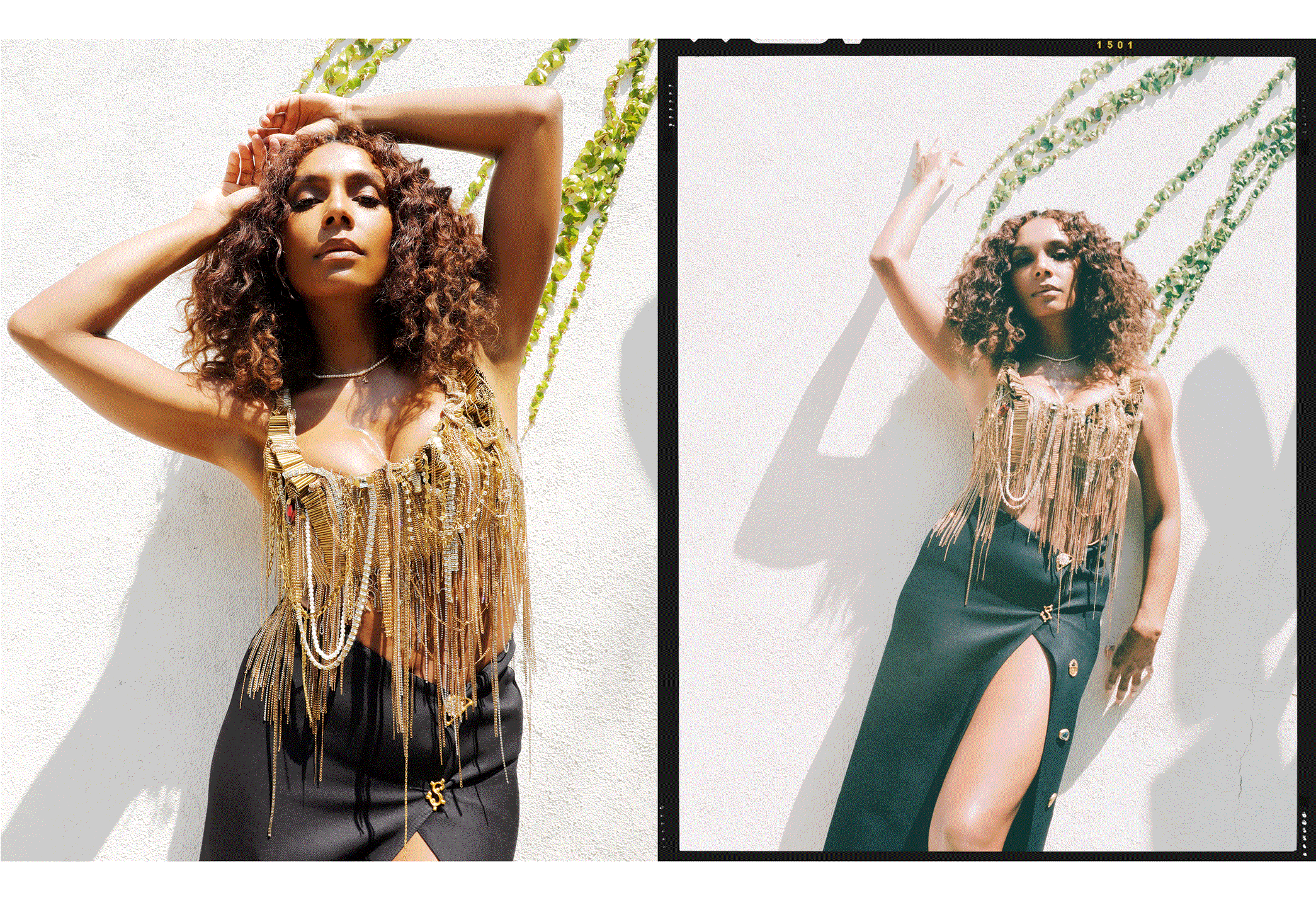
Mock's Writing Story
What power does being able to write your own story hold for you?
Being able to write my own story about myself has enabled me to have and has given me so much freedom. Being able to control the narrative, shape, and form the way I view my experiences, and how I will articulate and or prioritize some of those experiences, have opened the world up for me.
I think that if I was still sitting at People, telling very famous people’s stories for a living, I don’t think I would have been able to tap into what I think my purpose is in the world. (Not that I’m opposed if someone calls me and asks if I want to write a cover story on Beyoncé. I’m going to jump on it because I’m part of the Beyhive.) The main thing is being able to control my own narrative and to prioritize the things I think are most urgent at that particular time.
What parts of your screenwriting are inspired by your journey? And how much time has to pass after an experience to be able to write about it?
It’s so interesting because everyone says that they want to hear about my life since I’ve been a public persona, and I feel like that all is too close for me to talk about just yet. I don’t even have a proper framework for that. I don’t have enough takeaways or enough lessons, or enough distance. Like when I was writing Redefining Realness, I was writing about my experiences as a child and an adolescent and had at least a decade of separation. By that point, I had a good framework to be able to talk about my experiences and then also do the important internal work of learning to forgive the people that had wronged me along my journey. So I think you need that distance so you can write, as a memoirist, more wholly.
Now what I love about the work I get to do in film and television is that it’s based on some of my experiences but doesn’t have to be fully encompassing. I can use my personal experiences as a launching pad or as a lens into those stories without it becoming my full story. It’s freeing to write in a fictional space in that way.
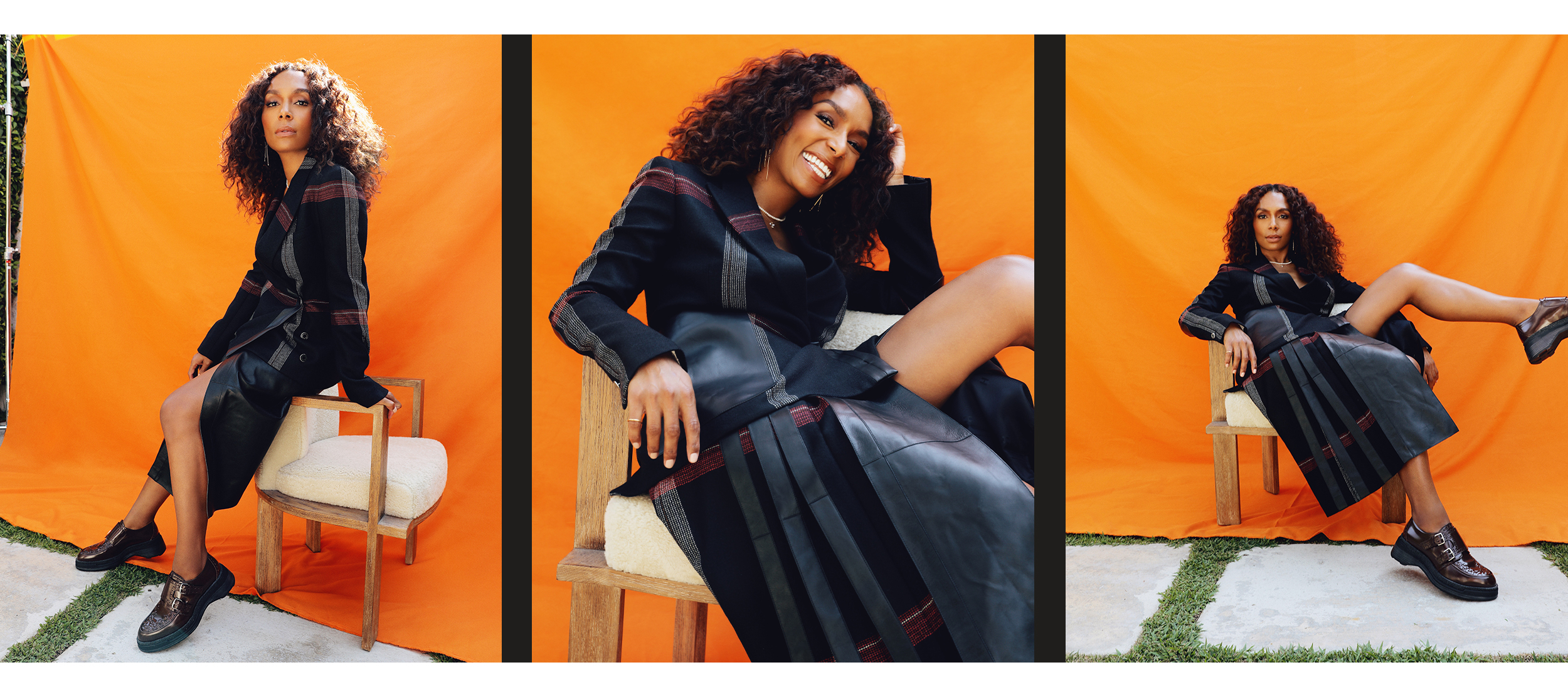
Mock's Hollywood Story
Given the ongoing discourse about representation in Hollywood, it’s an interesting time to be a creator in the entertainment space. Seeing as men have been portraying and winning awards for playing trans women as recently as 2016, do you think there are limitations to what roles an actor can step into or to who can tell a story?
I don’t want to put any limitations on what artists can do, what they choose to do, or what stories they try to tackle or encompass in their bodies—specifically for actors and even for writers and directors. I think for roles that are about representing marginalized people who are traditionally not given a foot into the door, it doesn’t feel right when someone that is not of that experience takes up that opportunity because we don’t get to see what someone from that community will be able to do.
From my own experience, if the co-creators of Pose (Ryan Murphy, Steven Canals, and Brad Falchuk) had not been deeply intentional about casting and writing about the experiences of the trans community authentically, the world wouldn’t have known that a wealth of talent was there waiting for an opportunity. The same thing can be said for disabled folk, Asian folk, Native American folk, and anyone who is watching pop culture take place from the margins. When we cast, write, and direct authentically, it makes our industry better, it makes the work better, and it leaves the audience with a deeply resonant experience they can engage with on-screen and behind the camera. We’re past a moment where someone who is not disabled is playing a disabled person. We’re past white people doing blackface. We’re past a moment where cisgender actors should be playing trans roles. Now, if you’re telling a cradle-to-grave story, that may call for creative casting, but I think the general rule is that we’ve surpassed that moment.
Are there any fellow writers, directors, or producers who you feel are telling necessary stories?
I would say people like Ahya Simone and Paige Wood. What they have done with Femme Queen Chronicles is powerful. I’m going to executive produce it. And my dear friend and sister Tourmaline, who is a writer, director, and long-time prison abolitionist. And Lady Dane Figueroa, another trans woman who is a powerful playwright and poet. Unfortunately, none of these people are in the unions of Hollywood. I’m still the only Black trans woman in the Writers Guild, in the Directors Guild, and the Producers Guild. We’re still very new into this movement, and this industry is just learning that our community—Black trans women and Black queer people—can tell their own stories. And so in the infancy of this stage that we’re in, to try to bring systemic change (at least in terms of representation for us), a part of my work is to make sure that I am doing that work of bringing my sisters in with me. So I just wanted to clarify that.
I appreciate that clarification because not everyone knows that, historically, people of color and the queer community have been severely underrepresented in Hollywood. As a multihyphenate who directs, produces and writes, how do you approach this space of collaboration versus a solo experience of bringing a script to life?
What’s so interesting about writing, directing, and television is that it’s all collaborative. Period. Unless you’re one of those wickedly talented people like Michaela Coel, who writes, directs, and stars in I May Destroy You. But even towards the end, she still has to collaborate with all of her people. For me, the muscles used in writing and directing are different in the level of intimacy it takes to direct actors. It takes a lot of empathy. Empathy in the sense of literally putting yourself in the character’s shoes and thinking about their motivations. Then, putting yourself in the actor’s shoes and knowing what their comforts are and what their strengths are. Plus the things they need to work on, the challenges, and what you have to workaround. All of that has to be in your head as a director. I love working with actors, and I know that I am an actor’s director. Every actor that I’ve directed knows that. I care about them. I love them, and I think what they do is incredibly courageous. I can express myself in that way on the page, but I’m not as comfortable expressing that with my full body out in the world with a camera rolling and 100 people in the room.
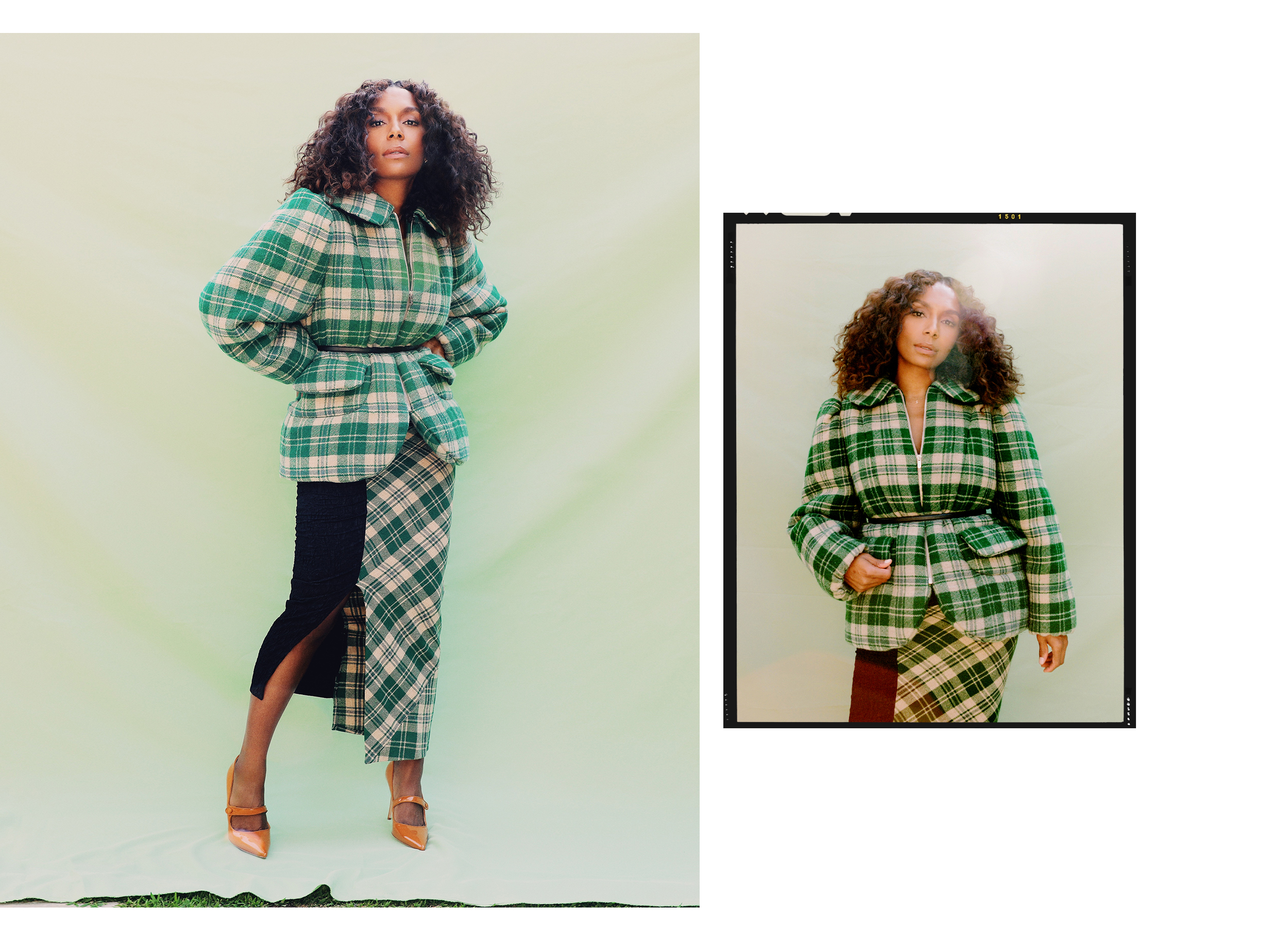
Mock's Style Story
Earlier in your career, you wanted to be editor in chief at a magazine, and now you’re a director and a producer for film and television. How did you evolve into the multifaceted person you are now? And how does personal style continue to play a role in everything you do?
I feel like they’re kind of the same jobs. In the end, I wanted to be in charge. I have different outfits for the different parts of what my job calls for. So in terms of my style directing, I’m wearing what I have on today (a head-to-toe Pyer Moss tracksuit). It’s always some kind of crazy-ass streetwear moment. When you direct an episode, you want to be comfortable. It’s all about function, so the style is very utilitarian. I’m also conscious on sets where it’s mostly men. It’s still a radical notion that a woman, or a woman of color—specifically a Black woman—is in charge on a set. And so it calls for a certain kind of presentation too. And then I have the public-facing part of my job, which is having to speak with the media, do press junkets, speak with journalists and critics that are covering our show, publicity campaigns, and more. That’s tons and tons of conversations that put me in a space where I have to look different (extremely polished), at least pre-COVID. But beyond how I dress every day, style overwhelmingly plays into the way I tell a story, in the way I move a camera, in the way that I speak to an actor, in how I would like them to be dressed… All of that stuff comes into play in terms of how I think they should look, and feel, and be. The through-line for me—from my old dreams of wanting to be editor in chief to now being a director and showrunner—is largely vision. What is your vision for yourself and for the stories you’re telling?
Personal style is very much a tool for Black and queer communities. It can be the difference between getting a job or not, or how a person is treated on a day-to-day basis. How have respectability politics and gender performance influenced your own personal style?
When I was younger, I was so much braver than I am now. Looking back, I’m like, "Oh my god, you wore that?!” It wasn’t until maybe four or five years ago that I was able to shed the idea of respectability politics and how I should present myself in order to be taken seriously. Specifically centering the ideal around Black, queer, and trans people, we’re contained in different ways. We’re hearing the same messages cis people are hearing about their bodies and how they should act, style their hair, wear their makeup, or what they should put on their bodies, but we have the added layer of still trying to just be seen and allowed into spaces as ourselves. It’s interesting to have these conversations with women around how you’re supposed to dress on set. I have no desire to dress like a man in order to be taken seriously by men. But there is still that element where I wonder, "Am I doing too much today?” I still do that kind of self-policing. The pressure, for me, is as a public and private person, and as a Black trans woman having to be a representative and doing it right so that they let more of us in. There are all these layers in me considering, "How am I going to dress today for work?” It’s a complicated question.
How has working with your stylist Jason Bolden helped evolve your approach to personal style both on and off the red carpet?
My greatest joy, to be honest, has been collaborating with Jason Bolden. When I was looking for a stylist, I never thought that it would be so healing. Jason has helped me refine my style on and off camera. His saying is always, "Leisure is luxury, luxury is leisure.” That’s something he always talks about. He was like, "Why wouldn’t you wear Pyer Moss? If you’re going to wear sweatpants, wear your best sweatpants in your closet.” Jason also reminds me not to save the stuff in my closet. He says, "You should be living in this stuff. Wear it every single day.” I love that, and it’s been a freeing exercise. Even on the red carpet, he was like, "No, we’re gonna serve body, but we’re also going to serve fashion. We’re gonna serve sexy, but we’re also gonna serve boss.” So he’s always thinking about that, and it’s always going to be expensive and luxurious because that’s what we’re projecting into the world with my style—that Black women are rich and decadent and desirable and aspirational and all of that stuff.
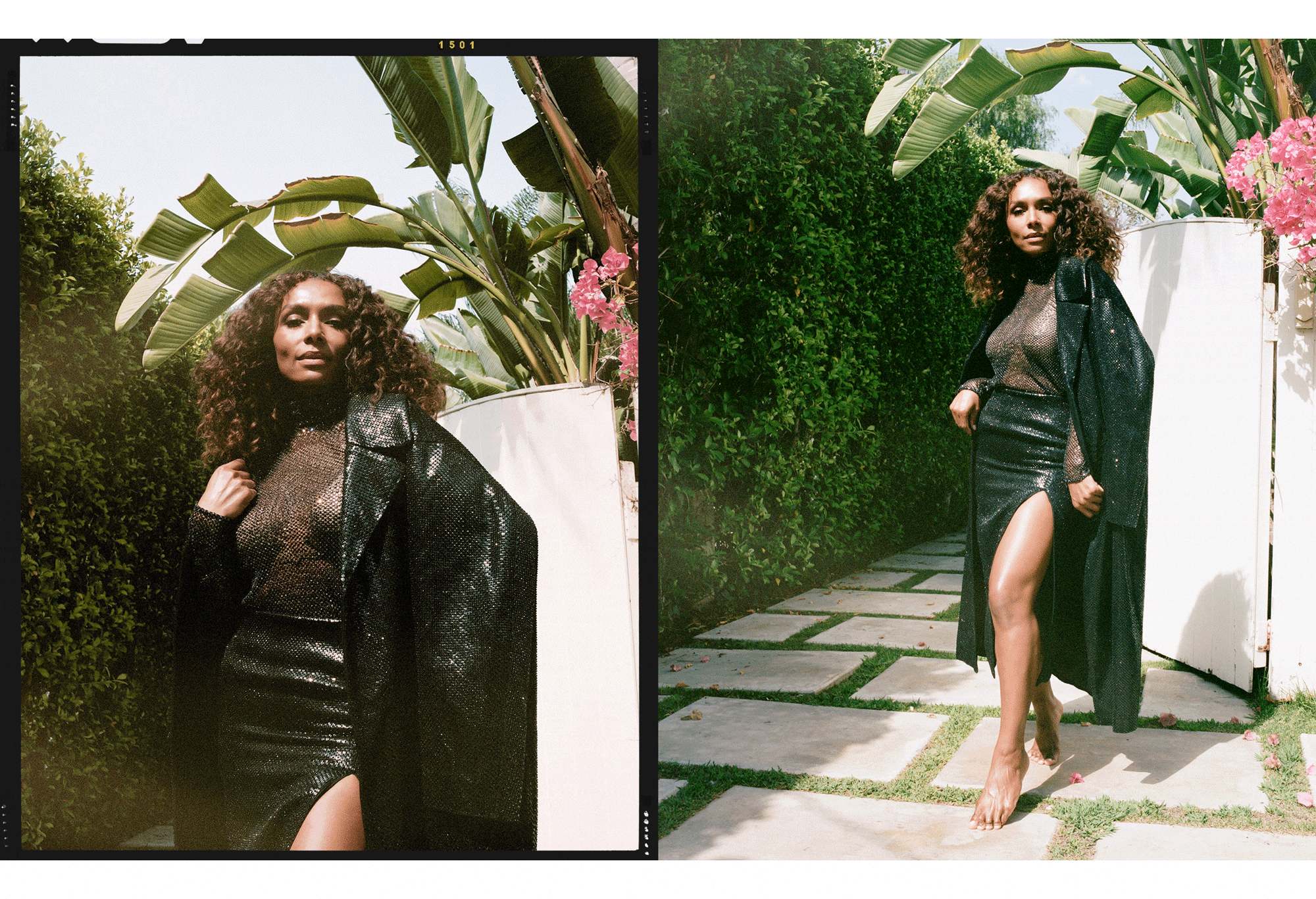
Mock's Self-Care Story
How do you discern healthy boundaries between the experiences you do and don’t share with the public and within your work?
It’s always based on my own personal comfort level. One thing I don’t talk about as much as I used to is my romantic relationships. I won’t do that again. I won’t hide my love life, but I’m just not going to expound upon it. That’s one boundary I have, and it’s helpful to know that some things are for me and that not every part of me is open to public consumption. I will never be the type of person that goes on social media and does that courageous work of being super vulnerable on IG Live. That’s just not ever going to be how I process. I process differently and go through a long process of feeling what I need to feel, and then I end up writing. I have some writing that I throw myself into, and that writing may never see the light of day, but it may end up in a monologue for one of my characters. It may end up as a theme for a new novel or a new series. As Nora Ephron says, "Everything is copy,” in a sense, but not everything may be shared in an obvious way. I’m just not like that.
How do you deal with the pressure of showing up for other people and strangers as a public figure? And how do you balance that pressure with showing up for yourself?
Oh, wow, so when you asked that question, the first thing that came to mind, as it’s the most urgent, is what happened this past week [in August] in Los Angeles. Three trans women of color were attacked on Hollywood Boulevard. And you know, L.A. is now my new home. Just the same way I was talking about how I process emotions, that’s how I process headlines and news. I’m always thinking let me process this for myself. "Let me get the information. Let me take in the information, and determine how I can show up.” With this headline, it’s essential that I show up in some way. And so to show up for other people, first, I have to show up for myself and recognize what feelings are going on before I can create content to urge other people to care, to share, or to show up for these women.
But in terms of my personal life, I only surround myself with people who don’t expect anything of me, except for me to be exactly where I am at that moment. So if, at that moment, that means that I am all of the things and doing way too much, they are there for that. And then also for moments where I have absolutely nothing to give, they’re there to help recharge me, knowing that it’s reciprocal and that I would do the same for them.
I think we have to expect all that we give to other people in our relationships to be given back to us in that same relationship, or else those relationships don’t work. And specifically, when I went public and started crafting what family and community looked like for me, and knowing that just because I’m Black and trans and a woman doesn’t mean that every Black person, trans person, or woman is one of my people or worth being in my intimate space. And that intimate space needs to be protected, because if I don’t have a sacred space to go to and relationships that fill me up and give to me, then I cannot then give anything to my communities at large outside of my intimate space.
Self-care has become so diluted. Why is it more important than ever to redefine our relationship to it? And are there any new self-care things that you’ve adopted through the quarantine?
This has been a transformative time and an illuminating time for people who are not of color or queer or trans, or all of those things. We’ve seen these videos, we’ve seen the footage before, we’ve seen uprisings. But for non-marginalized people, the uprisings feel different now because folks are not occupied with their everyday lives. So all the organizing that has happened over decades of work has been able to come into fruition, and people’s attention is there. So for me, at this time, one thing I’ve been clear about is that we have to make sure we’re taking care of ourselves and that we’re not sticking our necks out for movements that don’t stick their necks out for us.
I also have found that communal care has been something newer for me during this time. When I lead with vulnerability in my relationships, I find I take care of myself more, and then, I nurture that relationship because I create new bonds that enable us to both show up for each other.
Another thing I learned in quarantine is that not everything I write or do has to be something. It doesn’t have to be sold, it doesn’t have to be a TV show, it doesn’t have to be pitched, it doesn’t have to be a book. It could just be something I write for myself and put away and maybe I’ll be inspired to come up with a character later on. But the pressure to be productive during this downtime, to me, is one thing that has helped.
From your career to your quarantine hobbies, it’s clear you’ve had so many creative outlets, so where does that creative energy go next?
This next chapter of my life is about standing on my own as a writer and director with my projects that are not me assisting other people’s visions. It’s about finding out what it means for me to essentially focus on my voice and my vision, for the kind of worlds I want to see for my people, and for the women that I care about.
Photographer: Juan Veloz
Stylist: Jason Bolden
Hairstylist: Neeko
Makeup artist: Wendi Miyake
Next: All Dressed Up With Nowhere to Go: A Zoom Photo Shoot With Laura Harrier
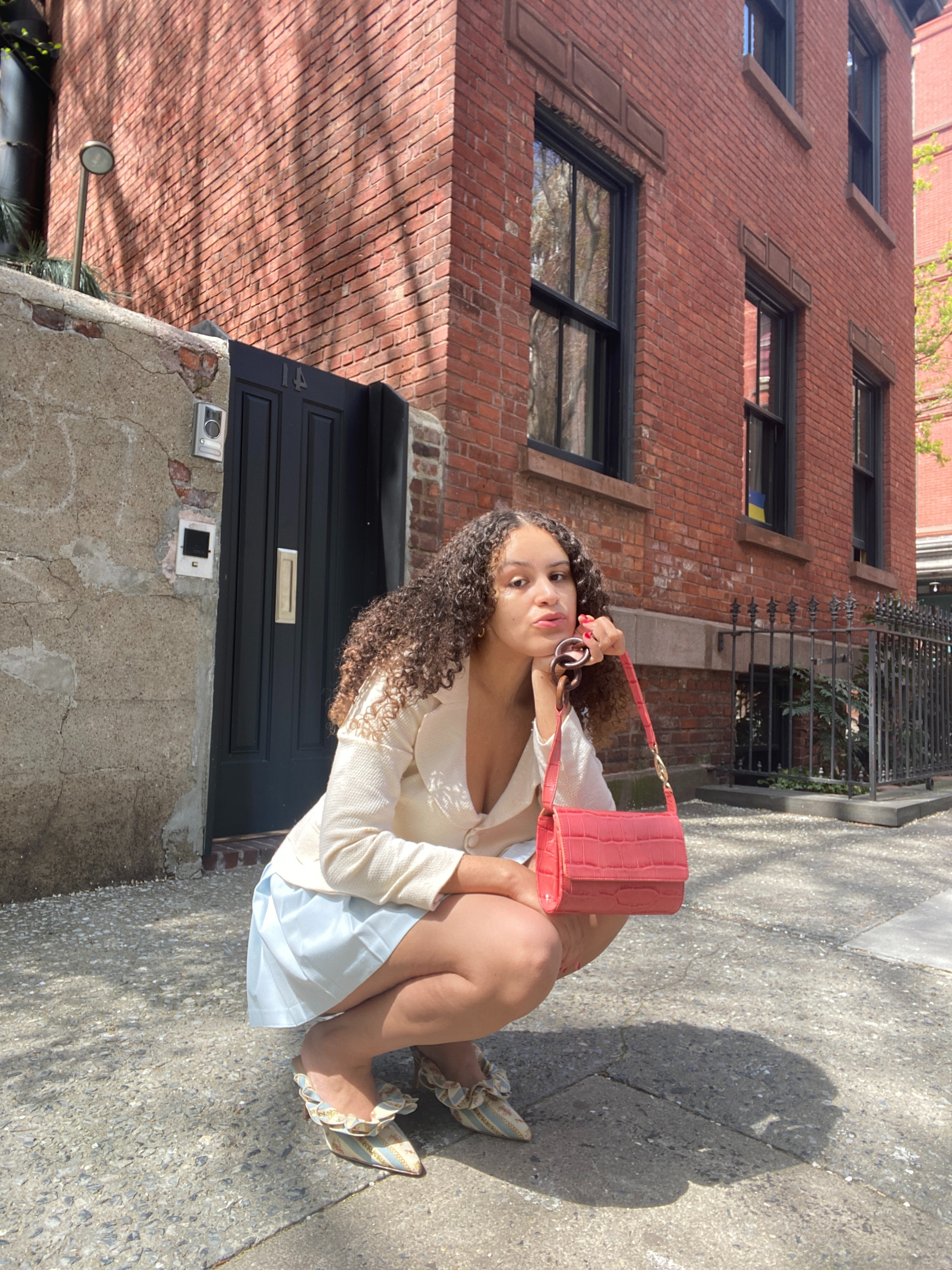
Jasmine Fox-Suliaman is a freelance writer and editor living in New York City. What began as a pastime (blogging on Tumblr) transformed into a lifelong passion for unveiling the connection between fashion and culture on the internet and in real life. Over the last decade, she's melded her extensive edit and social background to various on-staff positions at Who What Wear, MyDomaine, and Byrdie. More recently, she’s become a freelance contributor to other publications including Vogue, Editorialist, and The Cut. Off the clock, you can find her clutching her cell phone as she's constantly scrolling through TikTok and The RealReal, in search of the next cool thing.